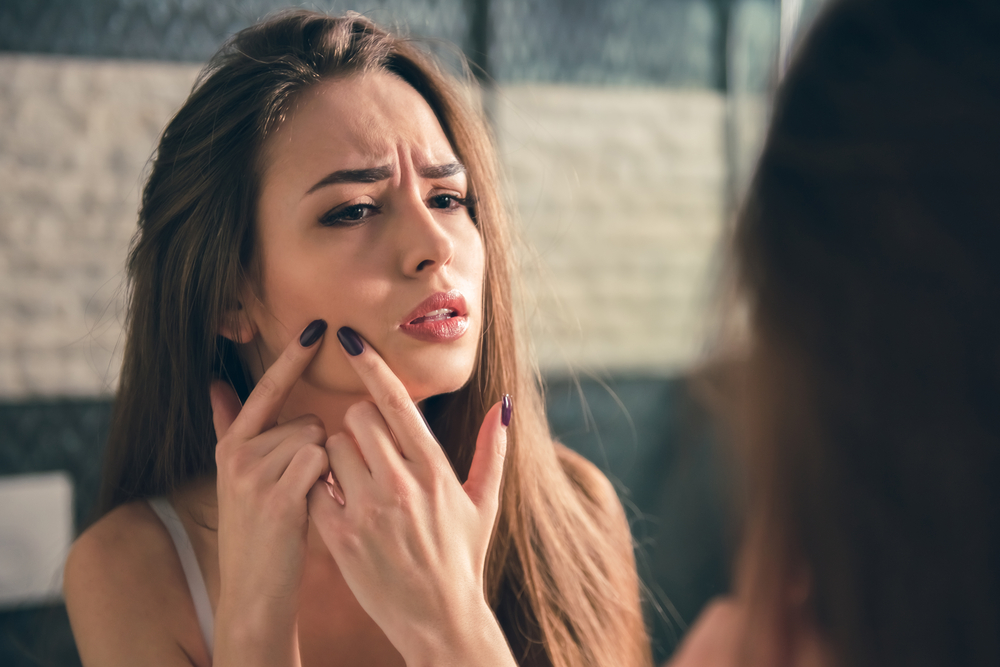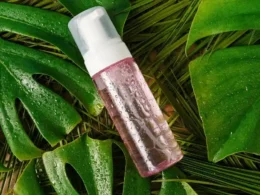- Lauric acid is a fatty acid that’s found primarily in coconuts.
- This compound has antibacterial properties and acts as an effective moisturizer.
- Caution: not all claims about coconut oil’s health benefits are backed by science.
Lauric acid is one of the latest “miracle” substances touted all over the web, in beauty magazines, and on television. There are entire books dedicated to coconut oil’s medicinal properties, claiming that it can cure everything from acne to baldness.
We reviewed the science behind these claims — here’s what pure lauric acid can actually do for your skin.
What is Lauric Acid?
Lauric acid is a medium-chain fatty-acid or triglyceride that falls into the category of organic compounds known as lipids. “Lipid” is another term for fat, which is an essential nutrient for cell-building and maintenance. When ingested, this compound breaks down into the monoglyceride monolaurin, which researchers believe might inhibit the growth of certain infection-causing pathogens.
Organic coconut oil is the best source for lauric acid since about half of its saturated fat consists of this fatty acid. Other natural sources include palm oil and butter made from the milk of grass-fed cows, goats or sheep.
Coconut Oil Benefits: Separating Science from Fiction
An online search for lauric acid or coconut oil will lead you to a plethora of websites boasting its health benefits, especially for your skin and hair. However, not all of the claims have been scientifically validated and some are flatly incorrect.
In this section, we list some of the more common ones and weigh in on whether they are true or false.
A Capable Sunscreen
We know how important it is to protect our skin from sun damage. Some beauty experts have suggested that coconut oil by itself is an effective sunscreen – unfortunately, this is just not true.
Although coconut oil is an ingredient used in many sunscreens, the oil itself has an SPF of only 1, which is far below the minimum SPF of 15 that doctors recommend for preventing skin cancer.
An Effective Treatment For Acne
You may have come across articles online on how coconut oil can help prevent and minimize acne breakouts as it can kill the bacteria that cause them. This claim may contain some measure of truth as there is some evidence to suggest that coconut oil may inhibit the growth of some common skin bacteria.
One study showed that lauric acid is 15 times better than benzoyl peroxide (an acne treatment) at slowing the growth of Propionibacterium acnes (P.acnes), the bacteria that causes acne. The study noted that it also reduced inflammation, and interestingly, had the same effects whether it was injected into the skin or applied topically.
Faster Wound Healing
A study on rats shows some support for this notion. The rats whose wounds were treated with virgin coconut oil healed at a much faster rate than those whose wounds were not treated with it. However, more data is needed before we can conclude that coconut oil helps wounds heal faster in humans.
We would advise taking this claim with a grain of salt. Exercise caution when applying anything to an open wound as it may introduce infection.
Treating Atopic Dermatitis
Atopic dermatitis is a chronic skin condition characterized by a red and itchy rash. In a randomized study, the patients who had their atopic dermatitis treated with coconut oil exhibited a 95% reduction of staphylococcus on their skin.
Since doctors now believe that bacteria are implicated in atopic dermatitis, these results are encouraging. However, more studies are needed before this claim is completely legitimized.
Moisturize Your Skin
Lipids play an important role in keeping the cells of the body lubricated – this applies to the skin as well. Coconut oil has long been a favorite ingredient in lotions and balms because of its pleasant smell and feel. Many people find it to be an excellent moisturizer, even on its own.
Fortunately, scientific evidence supports this. Researchers discovered in a small study that coconut oil fares as well as mineral oil as a moisturizing agent when applied to the skin. The study found that both oils increased skin hydration and the levels of surface lipids.
Thicker And Fuller Hair
Beauty sites tout coconut oil as an excellent moisturizer for the hair and scalp. Furthermore, they insist that it can promote hair growth and even address hair loss. But what do researchers have to say?
Studies published in the Journal of Cosmetic Science support some of these claims. One study indicates that coconut oil is better at infiltrating the hair follicle than mineral oil, while the other shows that coconut oil aids in reducing the amount of hair lost to breakage. These results suggest that coconut oil is a capable moisturizer that can promote hair growth by keeping the hair shaft lubricated and preventing breakage. It may also help with scalp conditions related to dryness, such as flaking skin.
Coconut oil can leave your hair feeling shiny and soft, so using it as a hair conditioner can’t hurt. However, there is no proof that it can halt hair loss, and while it may help fight bacterial infections, it isn’t a miracle cure for all scalp conditions.
Four Ways to Use Coconut Oil at Home
Coconut oil smells fabulous and feels wonderful when you apply it to your skin. Here are some ways you can use it to pamper yourself at home.
Homemade Body Butter
Using just a ¾ cup of coconut oil and a ¾ cup of cocoa butter, you can make your own moisturizing body butter.
Just melt down the butter and oil in a double boiler until it liquefies then harden it in the freezer for about 20 minutes. Next, whip it up with a whisk like you would whipping cream until the consistency is fluffy and light. Store it in a jar or other container and it will last up to three months.
Body Scrub
Make a coconut oil body scrub by mixing coconut oil with coconut sugar. The grains of sugar act as an abrasive while the oil moisturizes your skin.
Cuticle Oil
Plain coconut oil works great as a cuticle moisturizing oil, and may prevent nail infections due to its antimicrobial properties. Apply a drop to each finger and massage in after washing your hands or during a manicure.
Hair Conditioner
Massaging some virgin coconut oil through your tresses is a great way to ensure that your hair is properly hydrated.
Do not heat the oil in the microwave or over the stove. Instead, place a container with the oil inside a bowl of warm water and let it sit until it is soft. Apply it generously to your scalp and hair, and work it through to the ends. Leave it in for a half an hour and then rinse thoroughly.
The Bottom Line on Lauric Acid
While far from the miracle substance that some people claim it to be, coconut oil has some tangible benefits that are backed up by scientific studies.
Although it cannot cure baldness nor act as a sunscreen, using it on your skin and hair may help you curb acne breakouts, moisturize your skin and stop your hair from breaking at the ends.









